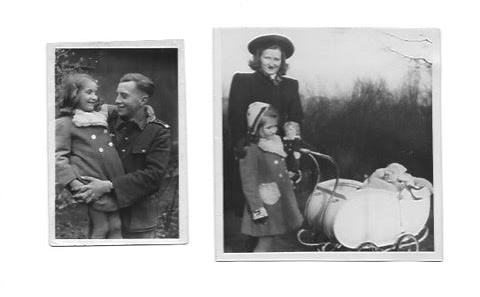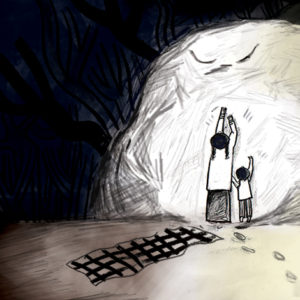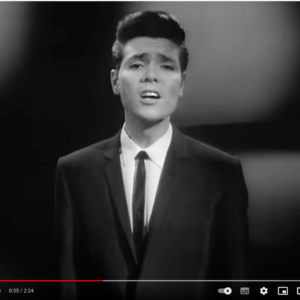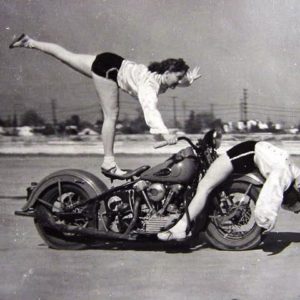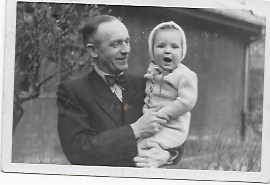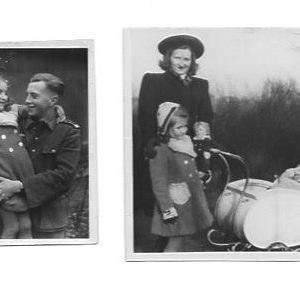1943 – The shelves in German stores may have been bare, and everything was on ration cards anyway, but an under-the-counter market existed for those who could afford it. My father was genuinely interested in keeping his business connections well-polished, and he was a passionate angler. Factories, mines, and most industrial zones had ponds on their terrains, and they were usually stocked with fish.
So, often, when my father came home from a visit to a client or business associate, one or two fish would be swimming in the bathtub. This was not a particular problem unless it was Saturday, the traditional day for tub baths in Europe in those days.
My father also built a coop and wire enclosure in the large flower garden behind our villa and installed some chickens there. These were purely utilitarian, not pets. We never gave them names, nor did we attempt to form a bond with them. I fiercely resented the lone goose, which had once very painfully pinched my belly when I followed our young Polish maid, Angela, as she tended to the poultry’s care. With hindsight, I cannot say that I blame the goose. My parents had sinister plans for her in mind. Angela knew from her growing-up years in a village how to fatten a goose for the special holiday when it would be roasted to crispy, golden perfection. She did this job in our kitchen, sitting on a low stool, holding the doomed creature firmly between her sturdy knees. One by one, she force-fed the goose a bowl full of some kind of long dumpling, which she had prepared in advance, especially for this procedure. With her left hand, she forced and held the goose’s beak open, pinching from both sides. With her right hand, she dropped a dumpling into the wide-open beak and with her index finger, she gave it a little shove. Then she let the goose close its mouth and holding the head high to keep the long neck extended, stroked it with the fingers of her right hand moving the lump down its length until the bulge disappeared in the goose’s body. She would keep doing this until the bowl was empty. Apparently, all this was done with the enthusiastic approval of my otherwise tender-hearted mother. I think today, it probably also was Angela’s duty to dispatch, eviscerate, and pluck the goose when the appointed day arrived, but I never had to witness it. Likely this was done while I napped after my bedtime.
It was my father, the angler himself, who was in charge of dispatching the fish he brought home. From these events, I was also careful, and with much drama on her part, shielded by my mother. She would take me into my parents’ bedroom and into the large marital bed where she hugged me tightly, with both of our heads buried into the huge feather pillows. Thus, we could comfort each other until my father came into the room to announce that it was safe to come out again. Often the fish was a carp, not particularly delicious and with many bones. Sometimes it was trout, and my father loved to have it baked in the oven. That was called preparing it “blue”.
To my mother’s great sorrow, I was a poor eater and stayed small and skinny. In class, I always had to be seated in the front row. The more she fretted, the more I saw this as my role in the daily family drama. When cod liver oil and “Pepsin” failed to stimulate my appetite, a plan using psychology was devised: the child of one of my father’s workers was invited over to our house every noon to eat lunch with me. This experiment was very successful – for the little girl, who would first eat her meal would then finish mine.
With Micky in a large pram, my parents would take us on walks into the euphemistically called “fresh air” of our coal-driven, industrial town, Hindenburg. Often our destination was a park called St. Guido Woods, where regional wild animals were kept in fenced pastures and pens. I remember that there were deer, foxes, and my favorites, raccoons. They are called “wash bears” in German, for their habit of dunking everything into the water before they devour it. Little did I know how fierce and destructive these creatures can be, and that I would later, in Texas, have to chase them out of our very own screened porch. But, back then, I thought they were adorable.
I remember that on some of these walks, we came past a midden, where people dumped worn-out items like bicycles and household goods. There, even though I was not yet school age, a lifelong passion for recycling materials and a horror of throwing things away, made its early appearance as my character evolved. I always saw things on that pile that seemed perfectly useful to me and that I wanted to take home. I distinctly remember one white enameled washbasin, which, though chipped, still seemed to me to have a lot of life left. My parents had to appease me by assuring me that we would pick these items up on our way home and then they had to choose a circuitous route around the midden to return to our house. Today it is fashionable to recycle and be green. I was a very early advocate.
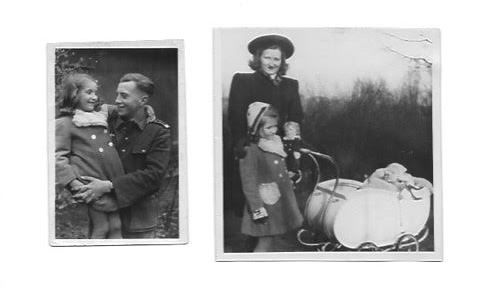
Left: Uncle Hansi, my mom’s younger brother and I.
Right: My mom, me, and my baby brother Micky in the pram.

